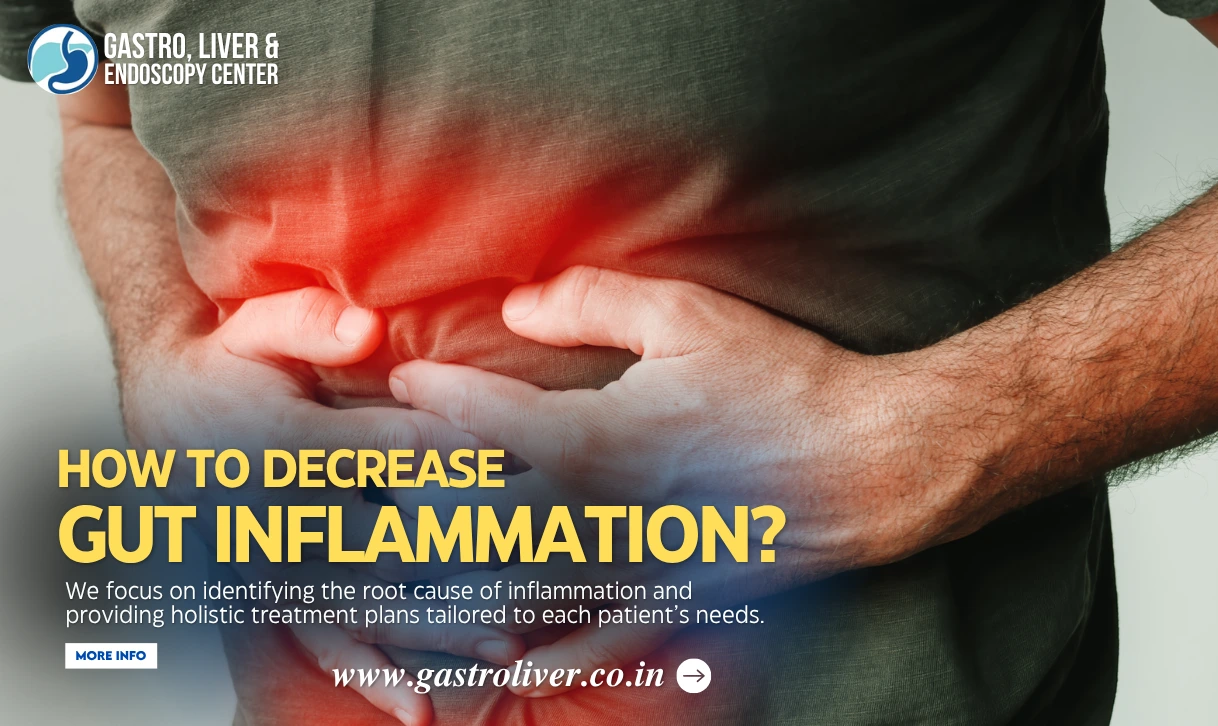How to Decrease Gut Inflammation?
Gut inflammation, also known as gastrointestinal inflammation, is a condition where the lining of your gastrointestinal (GI) tract becomes irritated or swollen due to various reasons—ranging from infections, poor diet, chronic stress, to autoimmune disorders like Crohn’s disease or ulcerative colitis. Persistent gut inflammation can cause a wide range of digestive symptoms such as bloating, abdominal pain, constipation, diarrhea, fatigue, and more. Managing and reducing gut inflammation is crucial not just for digestive health but also for overall well-being.
At the Gastro, Liver & Endoscopy Center, under the guidance of Dr. Manish Kumar Gupta, one of the Top Gastroenterologists in Noida and Ghaziabad, we focus on identifying the root cause of inflammation and providing holistic treatment plans tailored to each patient’s needs.
What Causes Gut Inflammation?:
Understanding the underlying causes is the first step toward healing the gut. Some common triggers of inflammation include:
- Poor Diet: High intake of processed foods, sugars, alcohol, and artificial additives can irritate the gut lining.
- Food Sensitivities: Gluten, dairy, soy, and certain grains may trigger inflammation in sensitive individuals.
- Infections: Bacterial, viral, or parasitic infections can cause acute or chronic inflammation.
- Autoimmune Conditions: Disorders like IBD (Inflammatory Bowel Disease), Crohn’s disease, and ulcerative colitis lead to long-term inflammation.
- Chronic Stress: Mental health and gut health are deeply linked; stress can aggravate or even cause inflammation.
- Imbalanced Gut Microbiome: A lack of healthy bacteria in the gut leads to dysbiosis, promoting inflammation.
Effective Ways to Decrease Gut Inflammation:
1. Adopt an Anti-Inflammatory Diet:
Understanding the underlying causes is the first step toward healing the gut. Some common triggers of inflammation include:
- Leafy greens like spinach and kale
- Fiber-rich vegetables
- Fresh fruits (low in sugar)
- Omega-3 rich foods like salmon, walnuts, and flaxseeds
- Whole grains like oats, brown rice, and quinoa
- Probiotic-rich foods such as yogurt, kefir, kimchi, and sauerkraut
Avoid or limit:
- Fried and fast foods
- Excess caffeine and alcohol
- Processed meats and refined sugars
- Dairy and gluten (especially if sensitive)/li>
3. Manage Stress Effectively:
Stress impacts the gut-brain axis and can trigger inflammatory responses. Simple practices can make a big difference:
- Meditation and deep breathing
- Regular exercise
- Yoga or tai chi
- Adequate sleep (7–9 hours)
Dr. Manish Kumar Gupta emphasizes stress management as part of every gut health treatment plan, especially for IBD and IBS patients.
4. Stay Hydrated:
Water is essential for flushing out toxins and maintaining mucosal lining integrity. Aim for 8–10 glasses of water daily, and avoid sugary or carbonated beverages.
5. Identify and Eliminate Food Triggers:
Some patients may have hidden food sensitivities that contribute to chronic inflammation. An elimination diet, guided by your gastroenterologist, can help pinpoint the culprits.
Our facility, known as the Best Endoscopy Centre in Noida and Ghaziabad, also offers diagnostic tools to identify gut inflammation sources precisely.
6. Use Medical Treatments When Necessary:
In moderate to severe cases, medications like anti-inflammatory drugs, immunosuppressants, or biologics may be required. Dr. Manish Kumar Gupta, one of the Top Gastroenterologists in Ghaziabad, ensures that all treatments are personalized and monitored closely for effectiveness.
7. Consider Gut-Friendly Supplements:
Some supplements may support gut healing:
- L-Glutamine: Repairs gut lining
- Omega-3 fatty acids: Fights inflammation
- Vitamin D: Strengthens immunity and gut barrier
- Zinc and Magnesium: Supports cellular repair
Always consult your gastroenterologist before beginning any supplement regimen.
When Should You See a Gastroenterologist?:
Persistent gut symptoms like bloating, cramps, irregular bowel habits, unexplained weight loss, or fatigue could indicate chronic inflammation. Early diagnosis and treatment can prevent complications.
Dr. Manish Kumar Gupta at the Gastro, Liver & Endoscopy Center is recognized as a Top Gastroenterologist in Noida and Ghaziabad, offering comprehensive care and advanced endoscopic procedures to address the root cause of your discomfort.
FAQs:
1. What are the symptoms of gut inflammation?
Common symptoms include bloating, gas, abdominal pain, constipation, diarrhea, fatigue, and food intolerances.
2. Can gut inflammation be reversed naturally?
Yes, in many cases, lifestyle changes like dietary improvements, stress reduction, and probiotic use can significantly reduce inflammation.
3. How long does it take to heal gut inflammation?
Healing time varies depending on the cause and severity. Some patients notice improvement in a few weeks; others may take months under medical supervision.
4. Is gut inflammation linked to other diseases?
Yes, chronic gut inflammation is linked to autoimmune disorders, skin conditions, mental health issues, and metabolic diseases.
5. Can endoscopy detect gut inflammation?
Yes, endoscopy is an effective tool to visually examine the GI tract and take biopsies if necessary. We provide expert endoscopic diagnosis at the Best Endoscopy Centre in Noida and Ghaziabad.
6. Should I avoid gluten and dairy if I have gut inflammation?
If you’re sensitive or intolerant, eliminating these can help. A gastroenterologist can help you determine your individual triggers.
7. Can stress alone cause gut inflammation?
Chronic stress can alter gut bacteria and increase intestinal permeability (leaky gut), contributing to inflammation.

